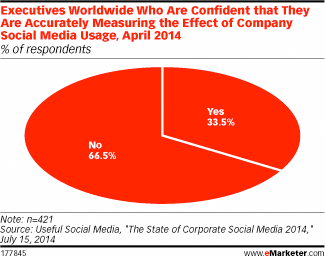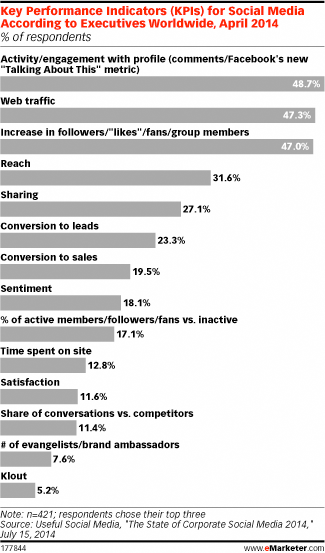When It Comes to Social Measurement, Corporate Marketers Can’t Get It Together
August 20, 2014
![]() Have corporate marketers figured out social media measurement? Based on April 2014 polling by Useful Social Media, not really. When the study asked corporate executives worldwide—those who said they worked for “brands, end-users and corporations”—if they were confident that they were accurately measuring social media’s effect, fewer than 34% of respondents said they were, a percentage that had changed little over the past four years.
Have corporate marketers figured out social media measurement? Based on April 2014 polling by Useful Social Media, not really. When the study asked corporate executives worldwide—those who said they worked for “brands, end-users and corporations”—if they were confident that they were accurately measuring social media’s effect, fewer than 34% of respondents said they were, a percentage that had changed little over the past four years.
 Corporations were measuring fewer metrics this year than previously. Looking at key performance indicators (KPIs), the majority listed had dropped in usage over the past few years. Useful Social Media noted that this could be either positive or negative: Perhaps executives were measuring less because growth in social had slowed, resulting in fewer resources and time available for measurement, or maybe executives had figured out which metrics were critical and gotten rid of the rest.
Corporations were measuring fewer metrics this year than previously. Looking at key performance indicators (KPIs), the majority listed had dropped in usage over the past few years. Useful Social Media noted that this could be either positive or negative: Perhaps executives were measuring less because growth in social had slowed, resulting in fewer resources and time available for measurement, or maybe executives had figured out which metrics were critical and gotten rid of the rest.
 The study said that the latter was likely the case, as more “advanced” metrics had generally seen the most growth. For example, engagement—the top KPI—had jumped 32% in the past two years, while sentiment tracking showed year-over-year growth of 38%. Previously popular, sales conversions and brand ambassadors dropped by 38% and 58%, respectively, between 2012 and 2014. Still, web traffic as well as followers, fans and group size—simple and relatively useless figures—ranked second and third, which Useful Social Media said was “slightly disconcerting.”
The study said that the latter was likely the case, as more “advanced” metrics had generally seen the most growth. For example, engagement—the top KPI—had jumped 32% in the past two years, while sentiment tracking showed year-over-year growth of 38%. Previously popular, sales conversions and brand ambassadors dropped by 38% and 58%, respectively, between 2012 and 2014. Still, web traffic as well as followers, fans and group size—simple and relatively useless figures—ranked second and third, which Useful Social Media said was “slightly disconcerting.”
In the end, half of corporate executives polled said they measured social’s return on investment (ROI).
January 2014 research by Demand Metric found similarly discouraging results. Among marketing professionals in North America, 70% couldn’t quantify the ROI for any of their social media efforts. Meanwhile, just 3% could measure social’s ROI for more than 35% of their campaigns.
Courtesy of eMarketer





























